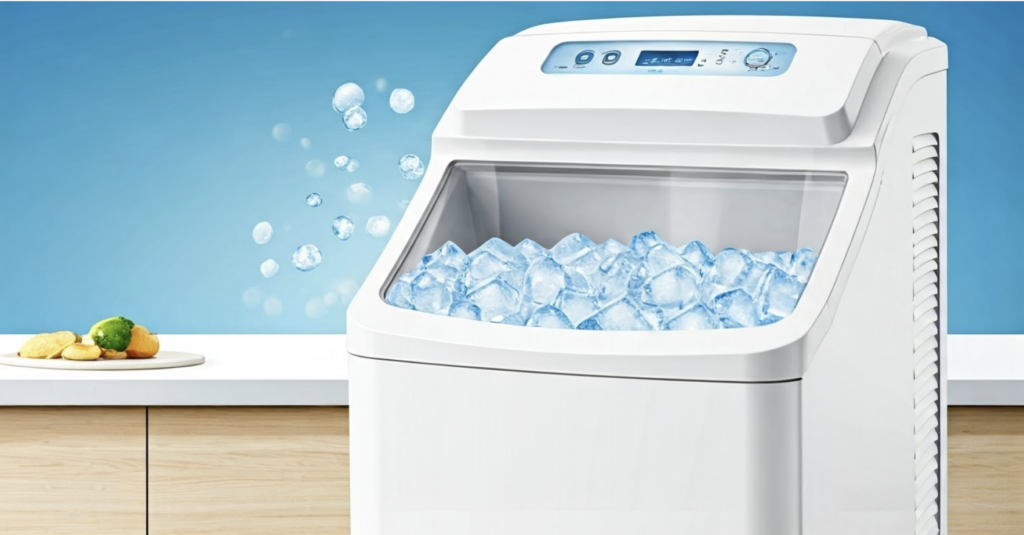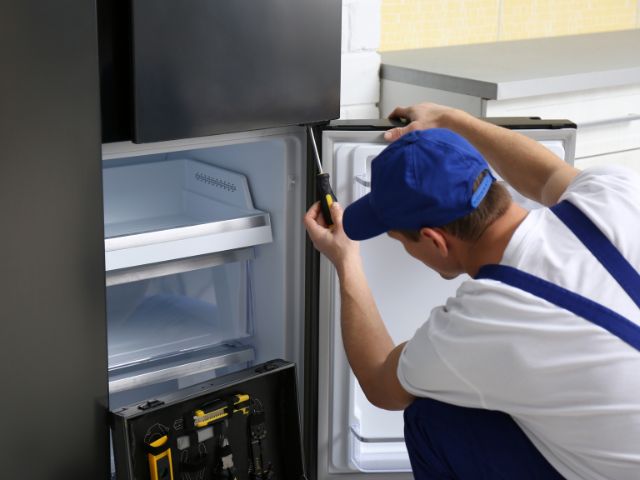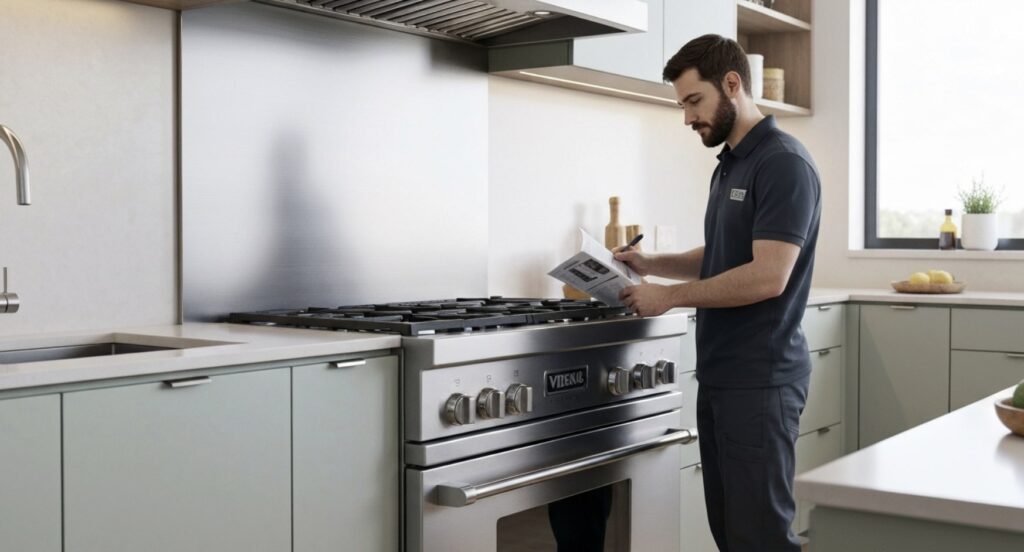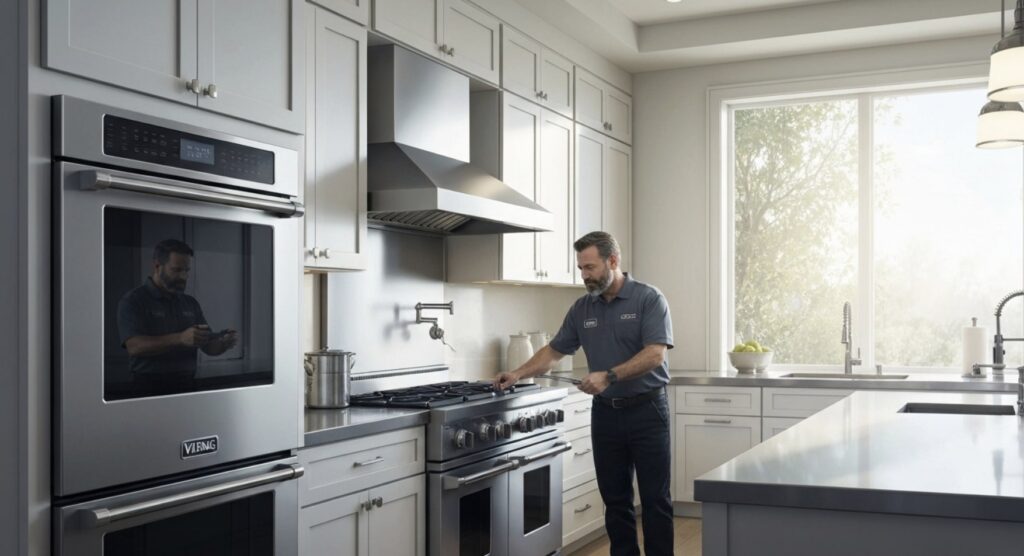There’s nothing better than a cold glass of water on a hot day. But your drink can taste bad if your ice maker is making ice cubes that don’t taste right. If ice makers produce ice with a bad taste, it means something is wrong with your appliance. The good news is, if you know what can cause these problems, you can fix your ice maker. Soon, you’ll be back to enjoying clear and tasty ice cubes again.
5 Common Reasons Your Ice Maker’s Ice Tastes Bad
Let’s be honest. Bad-tasting ice can really spoil your cold drinks. To fix this issue, you need to find out what’s causing it. This problem could come from a dirty water filter or even bad smells from the back of your fridge. No matter what the cause is, finding it is the first step to solving the problem.
Keep reading as we share some common reasons why your ice maker might not be making good ice. By learning about these typical issues, you will be ready to fix the problem and have fresh, tasty ice again soon.
Reason 1: Old and Stale Ice Accumulation
One simple reason your ice maker produces bad tasting ice is old, stale ice. When ice stays in the freezer for too long, it can soak up nearby odors and taste bad. This often happens if your freezer isn’t cleaned often or if it has strong-smelling food nearby.
Also, when ice melts and refreezes, it can trap dirt, which makes the taste worse. Each time ice melts and freezes again, it loses quality. It is important to deal with this issue regularly. To stop old ice from building up, try to empty your ice bin often and make a new batch.
By keeping a good flow of fresh ice, you can reduce the chances of bad tasting flavors and smells affecting your drinks.
Reason 2: Poor Water Quality Entering the Ice Maker
The water quality going into your ice maker is important for making good ice cubes. If your tap water has a lot of chlorine, minerals, or other dirt, these can build up when the water freezes. This makes the ice have a bad taste. In places with hard water, mineral buildup can happen inside your ice maker over time, which can also affect the taste.
Also, if your water supply lines are old or rusty, they can give the water a metal taste. This taste then shows up in your ice. It’s important to check your water quality if you think it might be why your ice has a bad taste. A simple water test can show if there are any impurities, so you’ll know if you need a water filter.
Getting a good water filter can help get rid of unwanted minerals, chemicals, and bad tastes, giving you cleaner and better-tasting ice cubes.
Reason 3: Infrequent Cleaning and Maintenance of the Ice Maker
Like any other appliance at home, your ice maker needs regular cleaning and care to work well. Over time, things like mineral deposits, mold, and mildew can build up in parts of the ice maker. This includes the water lines, ice tray, and dispenser.
These buildups can change the taste and smell of your ice a lot, leading to a bad experience. If you don’t clean it regularly, bacteria and mold can grow, which can be bad for your health, along with affecting the flavor of the ice. To avoid these problems, it’s important to add your ice maker to your regular cleaning schedule.
Check your appliance manual for specific cleaning directions and how often you should clean it. Putting in some effort to keep up with your ice maker can really help make sure you get clean, fresh-tasting ice.
Reason 4: The Ice Maker’s Water Filter Needs Replacement
Many ice makers today come with water filters. These filters are there to remove bad stuff from the water. But, after some time, they can get blocked with dirt, minerals, and other things. When a water filter is clogged or old, it can’t clean the water well anymore. This can make the taste and quality of your ice worse.
Also, a filter that works too hard can slow down the water flow to the ice maker. This can cause smaller ice cubes or even make the appliance stop working. To avoid these problems, it is important to follow the manufacturer’s advice on when to change the water filter.
By changing your ice maker’s water filter regularly, you help your appliance get clean water. This leads to better-tasting and odor-free ice cubes.
Reason 5: Cross-Contamination from Nearby Foods
Your freezer can hold many different smells. Sadly, your ice can take on these odors, making it taste bad. This happens when strong-smelling foods, like onions, garlic, or leftovers, release scents into the air in your freezer. The ice then absorbs these smells.
Freezing food stops bacteria from growing, but it does not stop smells from mixing. This can change the flavor of your ice. To avoid this, you should keep strong-smelling foods in airtight containers to reduce the transfer of odors.
Also, try to keep your food organized in the freezer. This helps keep your ice cubes tasting fresh.
Contact Viking Appliance Repair Pros for Reliable Service
If you have tried to fix the bad taste from your ice maker and it did not work, it may be time to call the experts. At Viking Appliance Repair Pros, we know how frustrating it is to deal with a broken appliance. This especially disrupts your daily routines. That is why we provide quick and reliable appliance repair services. We want to help get your ice maker working well again. Our team of certified technicians can find and fix many ice maker problems. We make sure you can enjoy fresh and clean-tasting ice again. Contact us today for a free estimate. Let us handle your appliance needs.
Conclusion
Having ice makers that produce ice with a bad taste can be annoying. Several reasons contribute to this problem. These include old ice builds up, poor water quality, and lack of care. To keep your ice fresh and tasty, it’s important to clean it regularly, check your water quality, and change the filters on time. If problems keep happening, get help from a professional service like Viking Appliance Repair Pros for trustworthy support. For more tips on keeping your ice and appliances in good shape, visit our blog on How to Fix Ice Maker Not Ejecting Ice at Home. Remember, a bit of care can help you enjoy clean and refreshing ice every time.
Frequently Asked Questions
How often should I clean my ice maker to prevent bad taste?
It is a good idea to clean your ice maker every 1-2 months. Doing this can help avoid bad taste and keep it hygienic. Regular cleaning stops mineral buildup and keeps mold and bacteria from growing. This way, your ice will taste fresh and clean.
Can the water supply line affect the taste of my ice?
The water supply line can change how your ice tastes. If the line is old, rusty, or has bad stuff in it, these things can mix with the ice while it freezes. This can make the ice taste bad.
What’s the best way to store ice to maintain its freshness?
The best way to keep ice fresh is to store it in an airtight container while it’s in the freezer. This stops the ice from taking in smells from other foods. It helps keep the ice tasting clean and fresh for a longer time.







